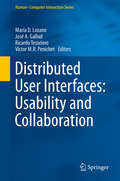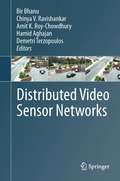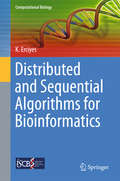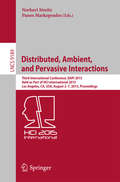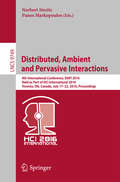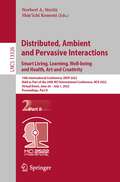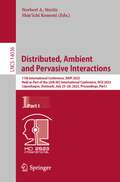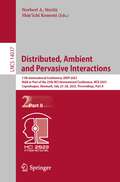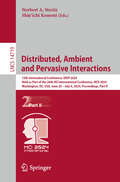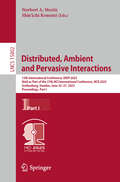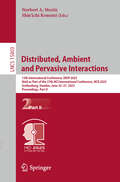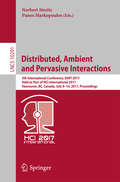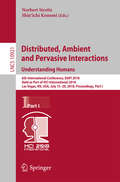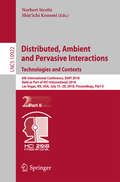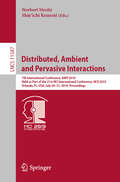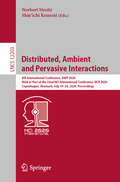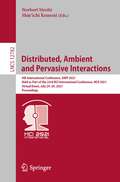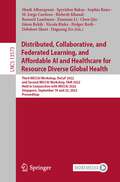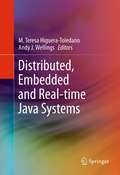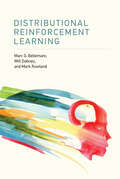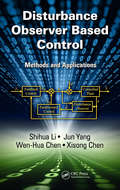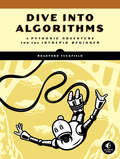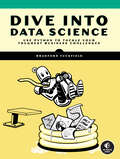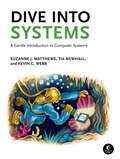- Table View
- List View
Distributed User Interfaces: Usability and Collaboration
by José A. Gallud Ricardo Tesoriero María D. Lozano Víctor M. R. PenichetWritten by international researchers in the field of Distributed User Interfaces (DUIs), this book brings together important contributions regarding collaboration and usability in Distributed User Interface settings. Throughout the thirteen chapters authors address key questions concerning how collaboration can be improved by using DUIs, including: in which situations a DUI is suitable to ease the collaboration among users; how usability standards can be used to evaluate the usability of systems based on DUIs; and accurately describe case studies and prototypes implementing these concerns. Under a collaborative scenario, users sharing common goals may take advantage of DUI environments to carry out their tasks more successfully because DUIs provide a shared environment where the users are allowed to manipulate information in the same space and at the same time. Under this hypothesis, collaborative DUI scenarios open new challenges to usability evaluation techniques and methods. Distributed User Interfaces: Collaboration and Usability presents an integrated view of different approaches related to Collaboration and Usability in Distributed User Interface settings, which demonstrate the state of the art, as well as future directions in this novel and rapidly evolving subject area.
Distributed Video Sensor Networks
by Bir Bhanu Demetri Terzopoulos Amit K. Roy-Chowdhury Hamid Aghajan Chinya V. RavishankarLarge-scale video networks are of increasing importance in a wide range of applications. However, the development of automated techniques for aggregating and interpreting information from multiple video streams in real-life scenarios is a challenging area of research. Collecting the work of leading researchers from a broad range of disciplines, this timely text/reference offers an in-depth survey of the state of the art in distributed camera networks. The book addresses a broad spectrum of critical issues in this highly interdisciplinary field: current challenges and future directions; video processing and video understanding; simulation, graphics, cognition and video networks; wireless video sensor networks, communications and control; embedded cameras and real-time video analysis; applications of distributed video networks; and educational opportunities and curriculum-development. Topics and features: presents an overview of research in areas of motion analysis, invariants, multiple cameras for detection, object tracking and recognition, and activities in video networks; provides real-world applications of distributed video networks, including force protection, wide area activities, port security, and recognition in night-time environments; describes the challenges in graphics and simulation, covering virtual vision, network security, human activities, cognitive architecture, and displays; examines issues of multimedia networks, registration, control of cameras (in simulations and real networks), localization and bounds on tracking; discusses system aspects of video networks, with chapters on providing testbed environments, data collection on activities, new integrated sensors for airborne sensors, face recognition, and building sentient spaces; investigates educational opportunities and curriculum development from the perspective of computer science and electrical engineering. This unique text will be of great interest to researchers and graduate students of computer vision and pattern recognition, computer graphics and simulation, image processing and embedded systems, and communications, networks and controls. The large number of example applications will also appeal to application engineers.
Distributed and Sequential Algorithms for Bioinformatics
by K. ErciyesThis unique textbook/reference presents unified coverage of bioinformatics topics relating to both biological sequences and biological networks, providing an in-depth analysis of cutting-edge distributed algorithms, as well as of relevant sequential algorithms. In addition to introducing the latest algorithms in this area, more than fifteen new distributed algorithms are also proposed. Topics and features: reviews a range of open challenges in biological sequences and networks; describes in detail both sequential and parallel/distributed algorithms for each problem; suggests approaches for distributed algorithms as possible extensions to sequential algorithms, when the distributed algorithms for the topic are scarce; proposes a number of new distributed algorithms in each chapter, to serve as potential starting points for further research; concludes each chapter with self-test exercises, a summary of the key points, a comparison of the algorithms described, and a literature review.
Distributed, Ambient and Pervasive Interactions
by Panos Markopoulos Norbert StreitzThis book constitutes the refereed proceedings of the 5th International Conference on Distributed, Ambient and Pervasive Interactions, DAPI 2013, held as part of the 15th International Conference on Human-Computer Interaction, HCII 2013, held in Las Vegas, USA in July 2013, jointly with 12 other thematically similar conferences. The total of 1666 papers and 303 posters presented at the HCII 2013 conferences was carefully reviewed and selected from 5210 submissions. These papers address the latest research and development efforts and highlight the human aspects of design and use of computing systems. The papers accepted for presentation thoroughly cover the entire field of human-computer interaction, addressing major advances in knowledge and effective use of computers in a variety of application areas. The total of 54 contributions was carefully reviewed and selected for inclusion in the DAPI proceedings. The papers are organized in the following topical sections: natural interaction; context-awareness in smart and intelligent environments; design and evaluation of smart and intelligent environments; smart cities; multi-user, group and collaborative interaction; smart everyday living and working environments.
Distributed, Ambient and Pervasive Interactions
by Panos Markopoulos Norbert StreitzThis book constitutes the refereed proceedings of the 4th International Conference on Distributed, Ambient, and Pervasive Interactions, DAPI 2016, held as part of the 18th International Conference on Human-Computer Interaction, HCII 2016, held in Toronto, ON, Canada, in July 2016 and received a total of 4354 submissions, of which 1287 papers were accepted for publication after a careful reviewing process. These papers address the latest research and development efforts and highlight the human aspects of design and use of computing systems. The papers accepted for presentation thoroughly cover the entire field of human-computer interaction, addressing major advances in knowledge and effective use of computers in a variety of application areas. This volume contains papers addressing the following major topics: designing and developing smart environments; tracking and recognition techniques in ambient intelligence; human behavior in smart environments; emotions and affect in intelligent environments; and smart cities and communities.
Distributed, Ambient and Pervasive Interactions. Smart Living, Learning, Well-being and Health, Art and Creativity: 10th International Conference, DAPI 2022, Held as Part of the 24th HCI International Conference, HCII 2022, Virtual Event, June 26 – July 1, 2022, Proceedings, Part II (Lecture Notes in Computer Science #13326)
by Shin’ichi Konomi Norbert A. StreitzThe two-volume set, LNCS 13325 and 13326, are conference proceedings that constitutes the refereed proceedings of the 10th International Conference on Distributed, Ambient and Pervasive Interactions, DAPI 2022, held as part of the 24th International Conference, HCI International 2022, which took place during June-July 2022. The conference was held virtually due to the COVID-19 pandemic. The 58 papers of DAPI 2022 are organized in topical sections named for each volume: Part I: User Experience and Interaction Design for Smart Ecosystems; Smart Cities, Smart Islands, and Intelligent Urban Living; Smart Artifacts in Smart Environments; and Opportunities and Challenges for the Near Future Smart EnvironmentsPart II: Smart Living in Pervasive IoT Ecosystems; Distributed, Ambient, and Pervasive Education and Learning; Distributed, Ambient, and Pervasive Well-being and Healthcare; and Smart Creativity and Art.
Distributed, Ambient and Pervasive Interactions: 11th International Conference, DAPI 2023, Held as Part of the 25th HCI International Conference, HCII 2023, Copenhagen, Denmark, July 23–28, 2023, Proceedings, Part I (Lecture Notes in Computer Science #14036)
by Shin’ichi Konomi Norbert A. StreitzThis book constitutes the refereed proceedings of the 11th International Conference on Distributed, Ambient and Pervasive Interactions, DAPI 2023, held as part of the 25th International Conference on Human-Computer Interaction, HCII 2023, which took place as an hybrid event in Copenhagen, Denmark, in July 2023.A total of 1578 papers and 396 posters have been accepted for publication in the HCII 2023 proceedings from a total of 7472 submissions.The 60 papers included in the DAPI 2023 proceedings were organized in topical sections as follows:Part I: Designing and evaluating intelligent environments; user experience in intelligent environments; pervasive data;Part II: Smart cities and environment preservation; media, art and culture in intelligent environments; supporting health, learning, work and everyday life.
Distributed, Ambient and Pervasive Interactions: 11th International Conference, DAPI 2023, Held as Part of the 25th HCI International Conference, HCII 2023, Copenhagen, Denmark, July 23–28, 2023, Proceedings, Part II (Lecture Notes in Computer Science #14037)
by Shin’ichi Konomi Norbert A. StreitzThis book constitutes the refereed proceedings of the 11th International Conference on Distributed, Ambient and Pervasive Interactions, DAPI 2023, held as part of the 25th International Conference on Human-Computer Interaction, HCII 2023, which took place as an hybrid event in Copenhagen, Denmark, in July 2023.A total of 1578 papers and 396 posters have been accepted for publication in the HCII 2023 proceedings from a total of 7472 submissions. The 60 papers included in the DAPI 2023 proceedings were organized in topical sections as follows: Part I: Designing and evaluating intelligent environments; user experience in intelligent environments; pervasive data; Part II: Smart cities and environment preservation; media, art and culture in intelligent environments; supporting health, learning, work and everyday life.
Distributed, Ambient and Pervasive Interactions: 12th International Conference, DAPI 2024, Held as Part of the 26th HCI International Conference, HCII 2024, Washington, DC, USA, June 29 – July 4, 2024, Proceedings, Part I (Lecture Notes in Computer Science #14718)
by Shin’ichi Konomi Norbert A. StreitzThis book constitutes the refereed proceedings of the 12th International Conference on Distributed, Ambient and Pervasive Interactions, DAPI 2024, held as part of the 26th International Conference on Human-Computer Interaction, HCI International 2024 (HCII 2024), was held as a hybrid event in Washington DC, USA, during June/July 2024. The total of 1271 papers and 309 posters included in the HCII 2023 proceedings was carefully reviewed and selected from 5108 submissions. The DAPI conference addressed approaches and objectives of information, interaction, and user experience design for DAPI Environments as well as their enabling technologies, methods, and platforms, and relevant application areas. The DAPI 2024 conference covered topics addressing basic research questions and technology issues in the areas of new modalities, immersive environments, smart devices, and much more.
Distributed, Ambient and Pervasive Interactions: 12th International Conference, DAPI 2024, Held as Part of the 26th HCI International Conference, HCII 2024, Washington, DC, USA, June 29 – July 4, 2024, Proceedings, Part II (Lecture Notes in Computer Science #14719)
by Shin’ichi Konomi Norbert A. StreitzThis book constitutes the refereed proceedings of the 12th International Conference on Distributed, Ambient and Pervasive Interactions, DAPI 2024, held as part of the 26th International Conference on Human-Computer Interaction, HCI International 2024 (HCII 2024), was held as a hybrid event in Washington DC, USA, during June/July 2024. The total of 1271 papers and 309 posters included in the HCII 2023 proceedings was carefully reviewed and selected from 5108 submissions. The DAPI conference addressed approaches and objectives of information, interaction, and user experience design for DAPI Environments as well as their enabling technologies, methods, and platforms, and relevant application areas. The DAPI 2024 conference covered topics addressing basic research questions and technology issues in the areas of new modalities, immersive environments, smart devices, and much more.
Distributed, Ambient and Pervasive Interactions: 13th International Conference, DAPI 2025, Held as Part of the 27th HCI International Conference, HCII 2025, Gothenburg, Sweden, June 22–27, 2025, Proceedings, Part I (Lecture Notes in Computer Science #15802)
by Shin’ichi Konomi Norbert A. StreitzThis two-volume set LNCS 15802-15803 constitutes the refereed proceedings of the 13th International Conference on Distributed, Ambient and Pervasive Interactions, DAPI 2025, held as part of the 27th International Conference on Human-Computer Interaction, HCII 2025, in Gothenburg, Sweden, during June 22-27, 2025. The total of 1430 papers and 355 posters included in the HCII 2025 proceedings was carefully reviewed and selected from 7972 submissions.The two volumes cover the following topics:Part I: Designing and developing intelligent environments; and user experience in intelligent environments.Part II: Smart cities and public spaces; eXtended reality and robots in intelligent environments; and wellbeing in intelligent environments.
Distributed, Ambient and Pervasive Interactions: 13th International Conference, DAPI 2025, Held as Part of the 27th HCI International Conference, HCII 2025, Gothenburg, Sweden, June 22–27, 2025, Proceedings, Part II (Lecture Notes in Computer Science #15803)
by Shin’ichi Konomi Norbert A. StreitzThis two-volume set LNCS 15802-15803 constitutes the refereed proceedings of the 13th International Conference on Distributed, Ambient and Pervasive Interactions, DAPI 2025, held as part of the 27th International Conference on Human-Computer Interaction, HCII 2025, in Gothenburg, Sweden, during June 22-27, 2025. The total of 1430 papers and 355 posters included in the HCII 2025 proceedings was carefully reviewed and selected from 7972 submissions.The two volumes cover the following topics:Part I: Designing and developing intelligent environments; and user experience in intelligent environments.Part II: Smart cities and public spaces; eXtended reality and robots in intelligent environments; and wellbeing in intelligent environments.
Distributed, Ambient and Pervasive Interactions: 5th International Conference, DAPI 2017, Held as Part of HCI International 2017, Vancouver, BC, Canada, July 9–14, 2017, Proceedings (Lecture Notes in Computer Science #10291)
by Panos Markopoulos Norbert StreitzThis book constitutes the refereed proceedings of the 5th International Conference on Distributed, Ambient and Pervasive Interactions, DAPI 2013, held as part of the 15th International Conference on Human-Computer Interaction, HCII 2013, held in Las Vegas, USA in July 2013, jointly with 12 other thematically similar conferences. The total of 1666 papers and 303 posters presented at the HCII 2013 conferences was carefully reviewed and selected from 5210 submissions. These papers address the latest research and development efforts and highlight the human aspects of design and use of computing systems. The papers accepted for presentation thoroughly cover the entire field of human-computer interaction, addressing major advances in knowledge and effective use of computers in a variety of application areas. The total of 54 contributions was carefully reviewed and selected for inclusion in the DAPI proceedings. The papers are organized in the following topical sections: natural interaction; context-awareness in smart and intelligent environments; design and evaluation of smart and intelligent environments; smart cities; multi-user, group and collaborative interaction; smart everyday living and working environments.
Distributed, Ambient and Pervasive Interactions: 6th International Conference, DAPI 2018, Held as Part of HCI International 2018, Las Vegas, NV, USA, July 15–20, 2018, Proceedings, Part I (Lecture Notes in Computer Science #10921)
by Norbert Streitz Shin’ichi KonomiThis two volume set constitutes the refereed proceedings of the 6th International Conference on Distributed, Ambient and Pervasive Interactions, DAPI 2018, held as part of the 20th International Conference on Human-Computer Interaction, HCII 2018, held in Las Vegas, NV, USA in July 2018. The total of 1171 papers and 160 posters presented at the 14 colocated HCII 2018 conferences. The papers were carefully reviewed and selected from 4346 submissions. These papers address the latest research and development efforts and highlight the human aspects of design and use of computing systems. The papers thoroughly cover the entire field of Human-Computer Interaction, addressing major advances in knowledge and effective use of computers in a variety of application areas.. The LNCS 10921 and LNCS 10922 contains papers addressing the following major topics: Technologies and Contexts ( Part I) and Understanding Humans (Part IΙ)
Distributed, Ambient and Pervasive Interactions: 6th International Conference, DAPI 2018, Held as Part of HCI International 2018, Las Vegas, NV, USA, July 15–20, 2018, Proceedings, Part II (Lecture Notes in Computer Science #10922)
by Norbert Streitz Shin’ichi KonomiThis two volume set constitutes the refereed proceedings of the 6th International Conference on Distributed, Ambient and Pervasive Interactions, DAPI 2018, held as part of the 20th International Conference on Human-Computer Interaction, HCII 2018, held in Las Vegas, NV, USA in July 2018. The total of 1171 papers and 160 posters presented at the 14 colocated HCII 2018 conferences. The papers were carefully reviewed and selected from 4346 submissions. These papers address the latest research and development efforts and highlight the human aspects of design and use of computing systems. The papers thoroughly cover the entire field of Human-Computer Interaction, addressing major advances in knowledge and effective use of computers in a variety of application areas..TheLNCS 10921 and LNCS 10922 contains papers addressing the following major topics: Technologies and Contexts ( Part I) and Understanding Humans (Part IΙ)
Distributed, Ambient and Pervasive Interactions: 7th International Conference, DAPI 2019, Held as Part of the 21st HCI International Conference, HCII 2019, Orlando, FL, USA, July 26–31, 2019, Proceedings (Lecture Notes in Computer Science #11587)
by Norbert Streitz Shin’ichi KonomiThis book constitutes the refereed proceedings of the 7th International Conference on Distributed, Ambient and Pervasive Interactions, DAPI 2019, held as part of the 21st International Conference on Human-Computer Interaction, HCII 2019, in Orlando, Florida, USA, in July 2019. A total of 1274 papers and 209 posters have been accepted for publication in the HCII 2019 proceedings from a total of 5029 submissions. The 36 papers included in this volume were organized in topical sections on IoT and big data; smart cities and built environments; perception and emotion in DAPI; and DAPI for health and learning.
Distributed, Ambient and Pervasive Interactions: 8th International Conference, DAPI 2020, Held as Part of the 22nd HCI International Conference, HCII 2020, Copenhagen, Denmark, July 19–24, 2020, Proceedings (Lecture Notes in Computer Science #12203)
by Norbert Streitz Shin’ichi KonomiThis conference proceeding LNCS 12203 constitutes the refereed proceedings of the 12th International Conference on Cross-Cultural Design, CCD 2020, held as part of HCI International 2020 in Copenhagen, Denmark in July 2020.The conference was held virtually due to the corona pandemic. The total of 1439 papers and 238 posters included in the 40 HCII 2020 proceedings volumes was carefully reviewed and selected from 6326 submissions. The regular papers of DAPI 2020, Distributed, Ambient and Pervasive Interactions, presented in this volume were organized in topical sections named: Design Approaches, Methods and Tools, Smart Cities and Landscapes, Well-being, Learning and Culture in Intelligent Environments and much more.
Distributed, Ambient and Pervasive Interactions: 9th International Conference, DAPI 2021, Held as Part of the 23rd HCI International Conference, HCII 2021, Virtual Event, July 24–29, 2021, Proceedings (Lecture Notes in Computer Science #12782)
by Norbert Streitz Shin’ichi KonomiThis conference proceedings LNCS 12782 constitutes the refereed proceedings of the 9 th International Conference on Distributed, Ambient and Pervasive Interactions, DAPI 2021, held as part of the 23rd International Conference, HCI International 2021, which took place in July 2021. The conference was held virtually due to the COVID-19 pandemic.The total of 1276 papers and 241 posters included in the 39 HCII 2021 proceedings volumes was carefully reviewed and selected from 5222 submissions. The papers of DAPI 2021, Distributed, Ambient and Pervasive Interactions, are organized in topical sections named: Smart Cities; IoT, Sensors and Smart Environments; Learning and Culture in Intelligent Environments; Designing Intelligent Environments.
Distributed, Collaborative, and Federated Learning, and Affordable AI and Healthcare for Resource Diverse Global Health: Third MICCAI Workshop, DeCaF 2022, and Second MICCAI Workshop, FAIR 2022, Held in Conjunction with MICCAI 2022, Singapore, September 18 and 22, 2022, Proceedings (Lecture Notes in Computer Science #13573)
by M. Jorge Cardoso Shadi Albarqouni Spyridon Bakas Islem Rekik Bennett Landman Nicola Rieke Holger Roth Daguang Xu Bishesh Khanal Debdoot Sheet Xiaoxiao Li Sophia Bano Chen QinThis book constitutes the refereed proceedings of the Third MICCAI Workshop on Distributed, Collaborative, and Federated Learning, DeCaF 2022, and the Second MICCAI Workshop on Affordable AI and Healthcare, FAIR 2022, held in conjunction with MICCAI 2022, in Singapore in September 2022. FAIR 2022 was held as a hybrid event.DeCaF 2022 accepted 14 papers from the 18 submissions received. The workshop aims at creating a scientific discussion focusing on the comparison, evaluation, and discussion of methodological advancement and practical ideas about machine learning applied to problems where data cannot be stored in centralized databases or where information privacy is a priority. For FAIR 2022, 4 papers from 9 submissions were accepted for publication. The topics of the accepted submissions focus on deep ultrasound segmentation, portable OCT image quality enhancement, self-attention deep networks and knowledge distillation in low-regime setting.
Distributed, Embedded and Real-time Java Systems
by M. Teresa Higuera-Toledano Andy J. WellingsResearch on real-time Java technology has been prolific over the past decade, leading to a large number of corresponding hardware and software solutions, and frameworks for distributed and embedded real-time Java systems. This book is aimed primarily at researchers in real-time embedded systems, particularly those who wish to understand the current state of the art in using Java in this domain. Much of the work in real-time distributed, embedded and real-time Java has focused on the Real-time Specification for Java (RTSJ) as the underlying base technology, and consequently many of the Chapters in this book address issues with, or solve problems using, this framework. Describes innovative techniques in: scheduling, memory management, quality of service and communication systems supporting real-time Java applications;Includes coverage of multiprocessor embedded systems and parallel programming;Discusses state-of-the-art resource management for embedded systems, including Java's real-time garbage collection and parallel collectors;Considers hardware support for the execution of Java programs including how programs can interact with functional accelerators;Includes coverage of Safety Critical Java for development of safety critical embedded systems.
Distributional Reinforcement Learning
by Mark Rowland Marc G. Bellemare Will DabneyThe first comprehensive guide to distributional reinforcement learning, providing a new mathematical formalism for thinking about decisions from a probabilistic perspective.Distributional reinforcement learning is a new mathematical formalism for thinking about decisions. Going beyond the common approach to reinforcement learning and expected values, it focuses on the total reward or return obtained as a consequence of an agent's choices—specifically, how this return behaves from a probabilistic perspective. In this first comprehensive guide to distributional reinforcement learning, Marc G. Bellemare, Will Dabney, and Mark Rowland, who spearheaded development of the field, present its key concepts and review some of its many applications. They demonstrate its power to account for many complex, interesting phenomena that arise from interactions with one's environment.The authors present core ideas from classical reinforcement learning to contextualize distributional topics and include mathematical proofs pertaining to major results discussed in the text. They guide the reader through a series of algorithmic and mathematical developments that, in turn, characterize, compute, estimate, and make decisions on the basis of the random return. Practitioners in disciplines as diverse as finance (risk management), computational neuroscience, computational psychiatry, psychology, macroeconomics, and robotics are already using distributional reinforcement learning, paving the way for its expanding applications in mathematical finance, engineering, and the life sciences. More than a mathematical approach, distributional reinforcement learning represents a new perspective on how intelligent agents make predictions and decisions.
Disturbance Observer-Based Control: Methods and Applications
by Jun Yang Shihua Li Wen-Hua Chen Xisong ChenDue to its abilities to compensate disturbances and uncertainties, disturbance observer based control (DOBC) is regarded as one of the most promising approaches for disturbance-attenuation. One of the first books on DOBC, Disturbance Observer Based Control: Methods and Applications presents novel theory results as well as best practices for applica
Dive Into Algorithms: A Pythonic Adventure for the Intrepid Beginner
by Bradford TuckfieldDive Into Algorithms is a broad introduction to algorithms using the Python Programming Language.Dive Into Algorithms is a wide-ranging, Pythonic tour of many of the world's most interesting algorithms. With little more than a bit of computer programming experience and basic high-school math, you'll explore standard computer science algorithms for searching, sorting, and optimization; human-based algorithms that help us determine how to catch a baseball or eat the right amount at a buffet; and advanced algorithms like ones used in machine learning and artificial intelligence. You'll even explore how ancient Egyptians and Russian peasants used algorithms to multiply numbers, how the ancient Greeks used them to find greatest common divisors, and how Japanese scholars in the age of samurai designed algorithms capable of generating magic squares.You'll explore algorithms that are useful in pure mathematics and learn how mathematical ideas can improve algorithms. You'll learn about an algorithm for generating continued fractions, one for quick calculations of square roots, and another for generating seemingly random sets of numbers.You'll also learn how to: • Use algorithms to debug code, maximize revenue, schedule tasks, and create decision trees • Measure the efficiency and speed of algorithms • Generate Voronoi diagrams for use in various geometric applications • Use algorithms to build a simple chatbot, win at board games, or solve sudoku puzzles • Write code for gradient ascent and descent algorithms that can find the maxima and minima of functions • Use simulated annealing to perform global optimization • Build a decision tree to predict happiness based on a person's characteristicsOnce you've finished this book you'll understand how to code and implement important algorithms as well as how to measure and optimize their performance, all while learning the nitty-gritty details of today's most powerful algorithms.
Dive Into Data Science: Use Python To Tackle Your Toughest Business Challenges
by Bradford TuckfieldLearn how to use data science and Python to solve everyday business problems.Dive into the exciting world of data science with this practical introduction. Packed with essential skills and useful examples, Dive Into Data Science will show you how to obtain, analyze, and visualize data so you can leverage its power to solve common business challenges.With only a basic understanding of Python and high school math, you&’ll be able to effortlessly work through the book and start implementing data science in your day-to-day work. From improving a bike sharing company to extracting data from websites and creating recommendation systems, you&’ll discover how to find and use data-driven solutions to make business decisions.Topics covered include conducting exploratory data analysis, running A/B tests, performing binary classification using logistic regression models, and using machine learning algorithms.You&’ll also learn how to:Forecast consumer demand Optimize marketing campaignsReduce customer attritionPredict website trafficBuild recommendation systemsWith this practical guide at your fingertips, harness the power of programming, mathematical theory, and good old common sense to find data-driven solutions that make a difference. Don&’t wait; dive right in!
Dive Into Systems: A Gentle Introduction to Computer Systems
by Suzanne J. Matthews Tia Newhall Kevin C. WebbDive into Systems is a vivid introduction to computer organization, architecture, and operating systems that is already being used as a classroom textbook at more than 25 universities.This textbook is a crash course in the major hardware and software components of a modern computer system. Designed for use in a wide range of introductory-level computer science classes, it guides readers through the vertical slice of a computer so they can develop an understanding of the machine at various layers of abstraction. Early chapters begin with the basics of the C programming language often used in systems programming. Other topics explore the architecture of modern computers, the inner workings of operating systems, and the assembly languages that translate human-readable instructions into a binary representation that the computer understands. Later chapters explain how to optimize code for various architectures, how to implement parallel computing with shared memory, and how memory management works in multi-core CPUs. Accessible and easy to follow, the book uses images and hands-on exercise to break down complicated topics, including code examples that can be modified and executed.
